|
|
|
Sort Order |
|
|
|
Items / Page
|
|
|
|
|
|
|
| Srl | Item |
| 1 |
ID:
142540
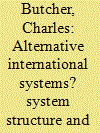

|
|
|
|
|
| Summary/Abstract |
Were precolonial state systems different to the European model? If so, how did these state systems vary, and do variations in system structure influence the frequency of war? In this article we assess the structure off international systems in nineteenth-century West Africa, Southeast Asia, and South Asia using new data on precolonial states that corrects for some of the biases in the existing Correlates of War state system membership data. We develop a framework to capture variation in political order above and below the state, and explore the similarities and differences between these systems and the European system we know and study. We then assess how rates of inter- and intra-state war varied across these systems. Our results suggest: (1) It is the nature of hierarchy (not so much anarchy) that varies across these systems; and (2) inter-state wars are more frequent, but less intense, in systems composed of decentralised states.
|
|
|
|
|
|
|
|
|
|
|
|
|
|
|
|
| 2 |
ID:
142544
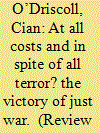

|
|
|
|
|
| Summary/Abstract |
Derived from the Latin Victoria, which itself can be traced to vino victus, meaning ‘to conquer’, victory evokes a number of close synonyms, principally conquest and triumph. It occupies an ambivalent position in respect of contemporary war. Though in some regards a concept that is essential to the very idea of combat, the notion of winning wars has acquired an ironic ring in the aftermath of two brutal world wars and the advent of nuclear weapons. Victory in war is clearly a contentious subject. Yet scholars of the just war tradition have largely ignored it. This article fills that breach by asking what, if anything, victory can mean in relation to just war? It argues that victory has an aporetic quality insofar as it appears both integral to but incompatible with the just war ethos. As such, it reveals both the limits and possibilities of just war thinking.
|
|
|
|
|
|
|
|
|
|
|
|
|
|
|
|
| 3 |
ID:
142543
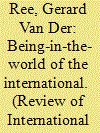

|
|
|
|
|
| Summary/Abstract |
Even though the international permeates our daily lives in many ways, it rarely discloses itself as part of our everyday engagements. Drawing from Martin Heidegger’s phenomenology, this article seeks to explore the ways in which the international remains hidden to, as well as the ways in which the international can become part of, our being-in-the-world. Additionally, it will show the terms in which International Relations (IR) scholars can disclose the world of the international, and what the implications of that ‘knowing’ are for the discipline. Finally, it will explore the possibilities and limitations of a Heidegerrian phenomenology for a social science such as IR.
|
|
|
|
|
|
|
|
|
|
|
|
|
|
|
|
| 4 |
ID:
142542


|
|
|
|
|
| Summary/Abstract |
Since the invasions of Afghanistan and Iraq, over 150 female American military personnel have been killed, over 70 following hostile fire. Given Western society’s long-standing practice of reserving the conduct of collective violence to men, these very public deaths are difficult to encompass within the normative and ideological structures of the contemporary American political system. This study examines the ways in which the public duty to commemorate the heroism of soldiers – and the private desire to accurately remember daughters and wives – poses a significant challenge to coherent discursive representation. In doing so, the study employs hermeneutical interpretation to analyse public representations of female soldiers and their relation to death in US popular culture. These representations are examined via Judith Butler’s concept of grievability – the possibility of receiving recognition as a worthy life within the existing social imaginary. It is argued that female soldiers are grievable as both ‘good soldiers’ and ‘good women’, but not as ‘good female soldiers’. The unified subject position of ‘good female soldier’ is liminal, and thus rendered socially and politically unintelligible. The article concludes with an analysis of the implications of this liminality for collective mourning and the possibility of closure after trauma.
|
|
|
|
|
|
|
|
|
|
|
|
|
|
|
|
| 5 |
ID:
142537
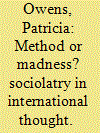

|
|
|
|
|
| Summary/Abstract |
International theory has a social problem. Twenty years after the so-called ‘social turn’, the historical origins of distinctly social forms of thought are not subject to scrutiny, let alone well understood. Indeed, the problem of the ahistorical social is an issue not only for predominant liberal, realist, and constructivist appropriations of social theory, but also the broad spectrum of critical and Marxist modes of theorising. In contrast to practicing sociolatry, the worship of things ‘socio’, this article addresses the historicity of the social as both a mode of thought – primarily in social theories and sociology – against the background of the emergence of the social realm as a concrete historical formation. It highlights problems with the social theoretic underpinnings of liberalism, social constructivism, and Marxism and advances an original claim for why the rise of the social was accompanied by attacks on things understood (often erroneously) as political. To fully understand these phenomena demands a closer examination of the more fundamental governance form the modern social realm was purported to replace, but which it scaled up and transformed.
|
|
|
|
|
|
|
|
|
|
|
|
|
|
|
|
| 6 |
ID:
142539
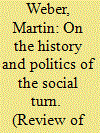

|
|
|
|
|
| Summary/Abstract |
The emergence of social theory is closely linked to the transformations inaugurated by the rise of a distinctly capitalist modernity from the second half of the eighteenth century onwards. In this article, I reconstruct the outlines of two strands of social theorising that emerged in response to the radical challenges posed by ‘the great transformation’ on the one hand, and the French Revolution on the other. I juxtapose two responses to the transnational constellations these events signify, one heralded by Auguste Comte, and the other, inter alia, by Karl Marx. While the Comtean frame obliterates meaningful registers of thinking about political transformation, I argue that conflict-theoretic tradition indebted to G. W. F. Hegel and Marx is much more amenable to analytical and practical concerns with responding politically to the challenges posed by ‘the rise of the social’. In the final part, this is discussed with reference to the ‘social turn’ in IR theory.
|
|
|
|
|
|
|
|
|
|
|
|
|
|
|
|
| 7 |
ID:
142538
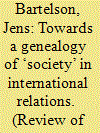

|
|
|
|
|
| Summary/Abstract |
The concept of society and its cognates have long been widely invoked in order to understand International Relations. Theories of international society distinguish between a society of states and a mere system of states, and theories of world society assume that the world constitutes a single social space. In order to come to terms with the social character of International Relations, constructivists of different stripes have invoked a societal context within which the construction of identities and norms takes place. As I shall argue in this article, these usages draw on conceptions of society that emerged during the early phases of modern sociology, and have then been projected onto alien historical and cultural contexts. In order to avoid the anachronism and Eurocentrism that invariably have resulted from these uncritical usages, I argue that academic International Relations should seek to accommodate those forms of human association that cannot be subsumed under a recognisably modern concept of society by incorporating insights from postcolonial sociology into its theoretical core.
|
|
|
|
|
|
|
|
|
|
|
|
|
|
|
|
| 8 |
ID:
142541


|
|
|
|
|
| Summary/Abstract |
Many analyses of the role of international norms in world politics study those particular norms that can be classified as relatively robust. Furthermore, such analyses critique alternative theories which foreground the role of domestic interests in affecting the behaviour of state elites, by calling into question the presumed objectivity of interests. The present article takes a different tack to the largely similar challenge. Specifically, it shows – on the example of Russian speakers in Ukraine – that even weak and contested international norms, like the norm of language rights for national minorities, can have independent effects on the behaviour and policy of state elites. The latter holds, in demonstrable terms, if state elites act in ways that militate against their most salient apparent interests. In the Ukraine case, this article argues, such ‘interests’ are the protection of the Ukrainian language as the country’s sole official language. So the cause of the (variable) behaviour of elites in Ukraine lay in a weak and contested norm, namely the norm of language rights for national minorities.
|
|
|
|
|
|
|
|
|
|
|
|
|
|
|
|
|
|
|
|
|